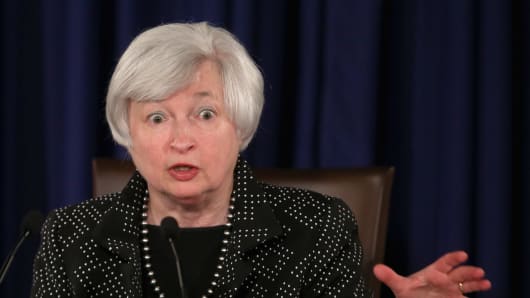Let's play a game of "What the Fed said vs. What traders heard":
On patience...
What the Fed said: "...economic activity has been expanding at a solid pace...Based on its current assessment, the Committee judges that it can be patient in beginning to normalize the stance of monetary policy."
What traders heard: The Fed is not going to raise rates for the next 6 months so it is safe to buy bonds.
Read MoreHere's what changed in the Fed statement
On targets...
What the Fed said: In determining how long to maintain this target range, the Committee will assess progress--both realized and expected--toward its objectives of maximum employment and 2 percent inflation.
What traders heard: With inflation expectations falling there is no shot of the Fed raising rates, which means the whole world will want to buy US bonds...and they will need U.S. dollars to buy our bonds. Hollah at the dollah!
On the economic recovery...
What the Fed said: The Committee currently anticipates that, even after employment and inflation are near mandate-consistent levels, economic conditions may, for some time, warrant keeping the target federal funds rate below levels the Committee views as normal in the longer run.
What traders heard: Wow, the Fed thinks that the economy might be in trouble even if inflation ticks up and employment remains robust ... we better sell stocks. This market is going to trade like a barrel of oil wrapped in euros!
Read MoreHere's why the Fed will raise rates in June: Bill Gross
The market reaction to the Fed statement should be quite troubling for the Federal Reserve. The statement opened the door to a global rates convergence trade and revealed the Fed is painted into a corner. Since virtually every other central bank in the world is on a policy-easing path, global bond yields are falling toward zero. Most importantly, they are already near zero in Germany. The German bund market is one of the only markets large enough to handle the enormous holdings that insurance companies, bond fund managers, and sovereign wealth funds require. The only other choice are U.S. Treasurys - and the cherry on top is that U.S. rates are much higher than German rates. The 10-year U.S. Treasury bond currently yields 1.72 percent, while the German 10-year bond yield is at 0.35 percent. Global investors have viewed this differential as a gift ... and the Fed just assured it will be the gift that keeps on giving. The resulting capital flows will mean lower U.S. bond yields and a higher U.S. dollar.
To an economist, this conclusion is paradoxical, because text books suggest that falling yields will dissuade investors. However, when every central bank in the world is driving rates to zero, investors will prefer the bond with the highest relative yield. Moreover, the collective herd action will support the underlying currency and reduce the currency risk ... but this is not captured in the Fed's models ... and herein lies the problem.



